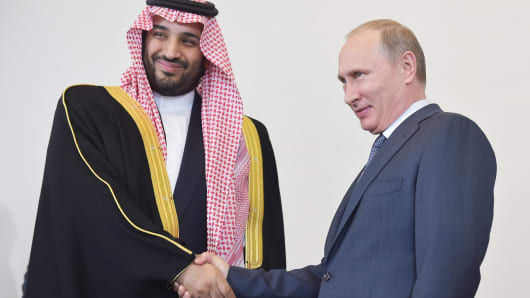Non-U.S. oil producers have become like a traveling vaudeville act. Let's call them "OPEC, featuring special guest, Russia."
Of late, they have raised to an art form the act of jawboning oil prices higher, carefully choosing their words to make it seem like a deal on freezing output or to "stabilize" the market is imminent. But a closer read of what they are saying keeps reducing the chatter to the status of mere platitudes.
The latest iteration of this act occurred over the weekend on a fairly significant stage, the G20 gathering in Hangzhou, China.
None other than Russia's leading man, Vladimir Putin and the newly minted Deputy Crown Prince of Saudi Arabia, Mohammed bin Salman came together to announce the signing of a joint statement by their respective oil ministers, which outlined aspirations of cooperation between the two countries, in the areas of technology and market information, to achieve market stability (i.e. get prices higher) along with the stated hope of bringing in other actors.
Of course, in keeping with the on-going ruse, the Saudi oil minister was quick to note that, "there is no need now to freeze production ... We have time to take this kind of decision." Adding that, "freezing production… does not have to happen specifically today."
Once again, the market rewarded the act, which now seems to include a carve out for Iran from any near-term limitations on its production.
Putin went as far to say that, "he thought it would be fair for Iran to pump as much oil as it was before international sanctions were imposed on it." Now, that's a friend looking out for a friend.
They certainly know how to play to their audience. Saudi comments kicked-off a nearly $12-dollar rally in crude oil prices last month. So, they keep rolling out the sequels.
The market seems to fear that it will be different this time. That an actual deal will emerge and be adhered to, even though history belies that belief.
Even the one time, sixteen years ago, when Russia agreed to curb output, along with OPEC, they failed to do so.
While the low price environment is increasingly driving this disparate group into each other's arms, the divide and distrust among them is just too great to overcome.
However, the one thing that might change the landscape would be a deal on Syria, between the U.S. and Russia, who represent the Kingdom and Iran, respectively, in the regional dispute. A deal on that nettlesome issue, might allow for a deal on the much more mundane topic of oil output limits.
Such a deal remains unlikely for now, with collapse of talks between President Obama and Vladimir Putin over the weekend over "trust" issues.
Of course, any deal to "stabilize" the market will only revive the shale oil industry even more than it has already, with the price rally back above $40 per barrel.
U.S. crude oil exports neared 700,000 barrels per day last week, as the economics of delivered oil sales to China, especially, increasingly favor U.S. producers.
Years of oil prices near the century mark pushed innovation and gave birth to the U.S. shale industry.
The recent spate of low oil prices has worked to curtail production in the U.S., but nowhere else, especially among the freeze deal proponents.
Supply and demand trends do point to a potentially higher-priced landscape for the industry in 2017, but don't look for OPEC and Russia to be the primary cause of any price rebound.
A lot of old Vaudeville acts ended with one or more of the protagonists getting a pie in the face. Don't let yourself be on the receiving end of a pie in the face from "OPEC, featuring special guest, Russia."
There will not be any substantive output deal.
At best, an agreement to cooperate, in the future may emerge – looking forward to it.



